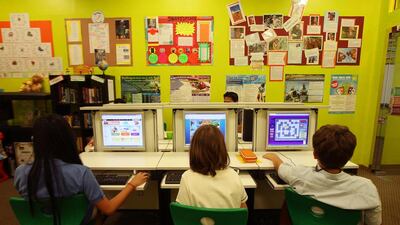A generation ago, personal computers were a relatively new thing and smartphones were non-existent. But every child going to school today is familiar with these products, along with a range of tablets, gaming consoles, smart TVs and other computer-driven and internet-connected devices. Everybody knows how to use them; the challenge is to find people to create the software that drives these devices and whatever comes after them. That's why the Computer Science First initiative launched this week is so important.
This collaboration between Abu Dhabi Education Council and technology giant Google will involve 250,000 pupils from private and public schools, and 300 specially trained teachers.
Just as youngsters before them learnt to read and write, today’s school students will need to be computer literate from a young age, and that includes knowing how to code. While that sounds a little daunting, it is important to point out that we are not talking about them all developing skills in high-level computer languages such as Pascal, C or Fortran – although some of them inevitably will. In Abu Dhabi schools, they will be using a tool called Scratch, which was developed by the Massachusetts Institute of Technology Media Lab and has a friendly drag-and-drop graphical interface that allows users to create interactive stories, games and animations, and share them over the internet.
It is a fun way for children and younger teenagers to get a feel for the rudiments of creating software. Implemented at primary level, it will help to ease the segue into the Stem – science, technology, engineering and maths – subjects that are being emphasised in the secondary and tertiary curriculums. Children learn quickly when it’s made enjoyable, so for some of them it won’t be such a huge step from creating a funny animation to developing a game-changing app.
The aim of this programme is to convert children from being passive users of technology into active developers. We may not know exactly what the future will hold, but we can do our best to ensure that it, and our nation’s future, is in safe and able hands. Initiatives such as this – which teach children to use state-of-the-art tools and encourage them to open their minds to new possibilities – are essential.

